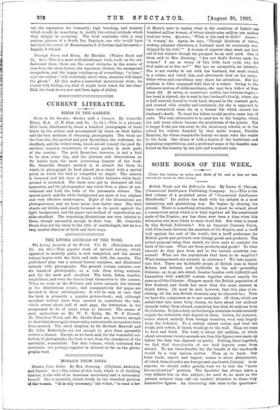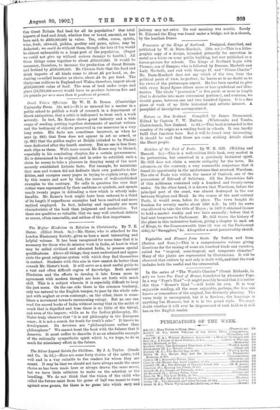SOME BOOKS OF THE WEEK.
[Under this heading we notice each Books of the "week as have not been reserved for review in other forms.] British Trade and the Zoliverein Issue. By Leone G. Chiozza. (Commercial Intelligence Publishing Company. ls.)—This is the first volume of a projected series of "Commercial Intelligence Handbooks." Its author has dealt with his subject in a most industrious and painstaking way. He begins by clearing the ground. There is something attractive, it must be owned, about a commercial union which is to bind together all the constituent parts of the Empire ; nor has there ever been a time when this attraction was more likely to make itself felt. But what is meant by this British Zollverein ? Not an Imperial Customs Union, with Free-trade between the members of the Empire, and a tariff wall against the rest of the world ; but a tariff preference for British goods and products over foreign goods and products. The, actual proposal being thus stated, we have next to consider the facts of the case. What are these products and goods? To what amount do they pass from and to the various countries con- cerned? What are the populations that have to be supplied? What arrangements are actually in existence ? We take popula- tion first. There are 41,500,000 people of British race in Great Britain and Ireland, and 11,000,000 in the self - governing Colonies ; or, to go into detail, Greater London with 6,580,616 and Lancashire with 4,406,787 contain together almost exactly the same as all the Colonies ; Glasgow equals the British population of New Zealand, and Leeds has more than the same element in South Africa. (It must be said, however, that this plan of ex- cluding all the non-British elements may be objected to.) Then we have the comparison as to raw materials. Of these, which are subdivided into some forty classes, we have about 110 millions (pounds value) from abroad, something less than 50 millions from the Colonies. To put a duty on the foreign materials would certainly cripple the industries that depend on them. Cotton, for instance, comes almost entirely from foreign countries, wool very largely from the Colonies. To a certain extent cotton and wool are rivals, and cotton, if taxed, would go to the wall. Then we come to food and drink. The total is about 220 millions, of which about seventeen twenty-seconds are free (the figures were made up before the duty was imposed on grain). Putting these together, we find that three-fourths of our food imports come from abroad. To tax three-fcauths for the benefit of the one-fourth would be a very serious matter. Then as to trade. Our total trade, export and import, comes to about £800,000,000, of which three-fourths are foreign and one-fourth Colonial. As to exports, we should suffer greatly were we to lose the " most. favoured-nation" position. The Spectator has always taken e, very definite line on this subject ; we need do no more on the present occasion than call our readers' attention to these very instructive figures. An interesting side issue is the question—. Can Great Britain find food for all its population? Our total imports of food and drink, whether free or taxed, amount, as has been said, to £220,000,000 in value. Tea, coffee, cocoa, spirits, wine, fruit, olive-oil, pickles, poultry and game, spices, may be deducted ; we could do without them, though the loss of tea would be almost unbearable to a large part of the population. (Sugar we could not give up without serious damage to health.) All these things come together to about £30,000,000. It would be necessary, therefore, to increase the production of Great Britain and Ireland by £190,000,000. Mr. Chiozza finds that the food and drink imports of all kinds come to about .25 per head, or, de- ducting so-called luxuries as above, about .24 13s. per head. The thirty-one millions in England and Wales, therefore, import about .2133,000,000 value of food. The area of land under crops and grass (24,763,000 acres) would have to produce between five and six pounds per acre more than it produces at present.







































 Previous page
Previous page